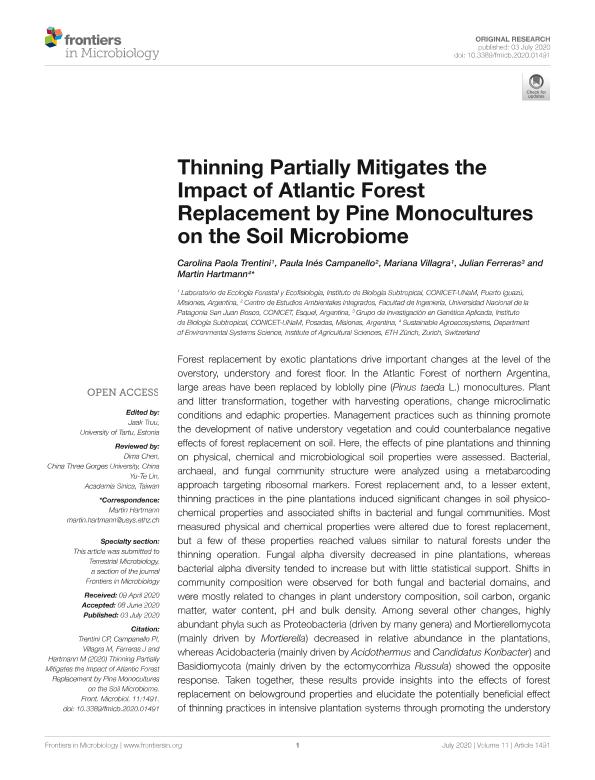Artículo
Thinning partially mitigates the Impact of atlantic forest replacement by pine monocultures on the soil microbiome
Trentini, Carolina Paola ; Campanello, Paula Inés
; Campanello, Paula Inés ; Villagra, Mariana
; Villagra, Mariana ; Ferreras, Julian Alberto
; Ferreras, Julian Alberto ; Hartmann, Martin
; Hartmann, Martin
 ; Campanello, Paula Inés
; Campanello, Paula Inés ; Villagra, Mariana
; Villagra, Mariana ; Ferreras, Julian Alberto
; Ferreras, Julian Alberto ; Hartmann, Martin
; Hartmann, Martin
Fecha de publicación:
07/2020
Editorial:
Frontiers Media S.A.
Revista:
Frontiers in Microbiology
ISSN:
1664-302X
Idioma:
Inglés
Tipo de recurso:
Artículo publicado
Clasificación temática:
Resumen
Forest replacement by exotic plantations drive important changes at the level of the overstory, understory and forest floor. In the Atlantic Forest of northern Argentina, large areas have been replaced by loblolly pine (Pinus taeda L.) monocultures. Plant and litter transformation, together with harvesting operations, change microclimatic conditions and edaphic properties. Management practices such as thinning promote the development of native understory vegetation and could counterbalance negative effects of forest replacement on soil. Here, the effects of pine plantations and thinning on physical, chemical and microbiological soil properties were assessed. Bacterial, archaeal, and fungal community structure were analyzed using a metabarcoding approach targeting ribosomal markers. Forest replacement and, to a lesser extent, thinning practices in the pine plantations induced significant changes in soil physico-chemical properties and associated shifts in bacterial and fungal communities. Most measured physical and chemical properties were altered due to forest replacement, but a few of these properties reached values similar to natural forests under the thinning operation. Fungal alpha diversity decreased in pine plantations, whereas bacterial alpha diversity tended to increase but with little statistical support. Shifts in community composition were observed for both fungal and bacterial domains, and were mostly related to changes in plant understory composition, soil carbon, organic matter, water content, pH and bulk density. Among several other changes, highly abundant phyla such as Proteobacteria (driven by many genera) and Mortierellomycota (mainly driven by Mortierella) decreased in relative abundance in the plantations, whereas Acidobacteria (mainly driven by Acidothermus and Candidatus Koribacter) and Basidiomycota (mainly driven by the ectomycorrhiza Russula) showed the opposite response. Taken together, these results provide insights into the effects of forest replacement on belowground properties and elucidate the potentially beneficial effect of thinning practices in intensive plantation systems through promoting the understory development. Although thinning did not entirely counterbalance the effects of forest replacement on physical, chemical and biological soil properties, the strategy helped mitigating the effects and might promote resilience of these properties by the end of the rotation cycle, if subsequent management practices compatible with the development of a native understory vegetation are applied.
Archivos asociados
Licencia
Identificadores
Colecciones
Articulos(IBS)
Articulos de INSTITUTO DE BIOLOGIA SUBTROPICAL
Articulos de INSTITUTO DE BIOLOGIA SUBTROPICAL
Citación
Trentini, Carolina Paola; Campanello, Paula Inés; Villagra, Mariana; Ferreras, Julian Alberto; Hartmann, Martin; Thinning partially mitigates the Impact of atlantic forest replacement by pine monocultures on the soil microbiome; Frontiers Media S.A.; Frontiers in Microbiology; 11; 7-2020; 1-18
Compartir
Altmétricas



